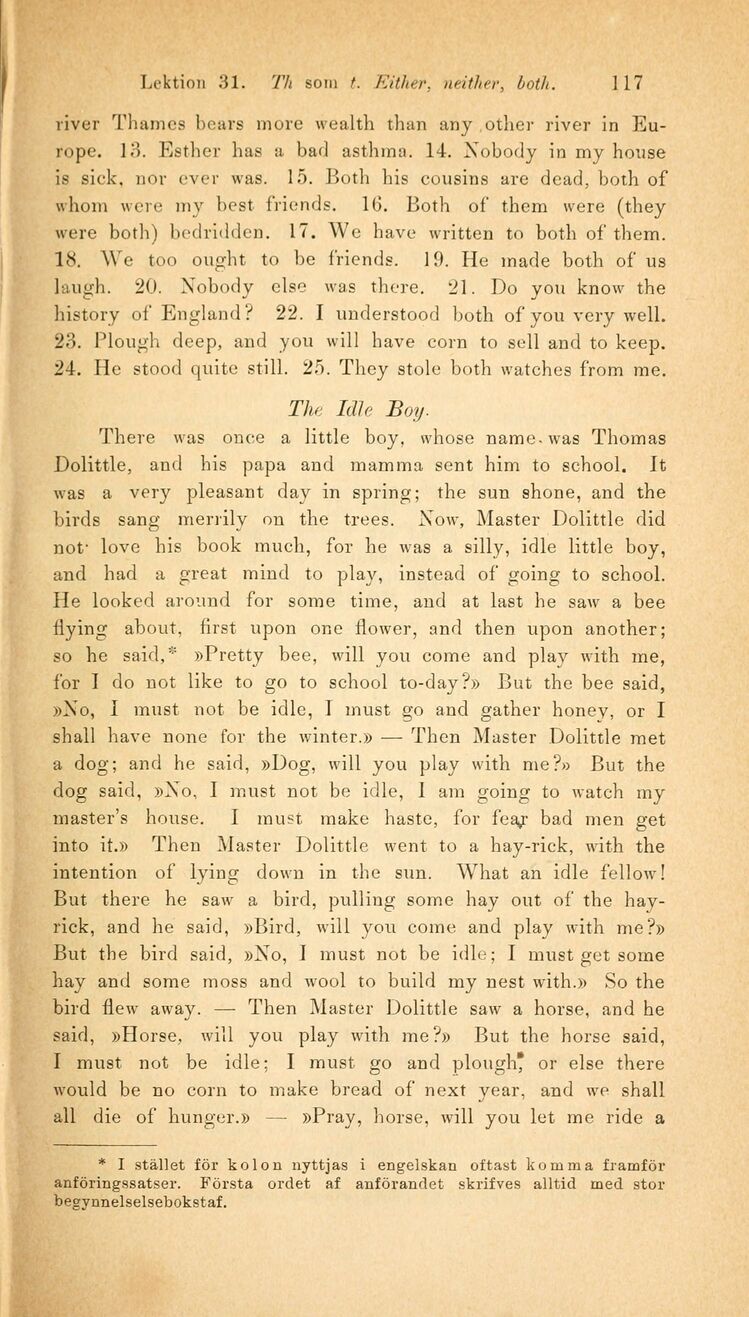
Full resolution (JPEG) - On this page / på denna sida - Sidor ...

<< prev. page << föreg. sida << >> nästa sida >> next page >>
Below is the raw OCR text
from the above scanned image.
Do you see an error? Proofread the page now!
Här nedan syns maskintolkade texten från faksimilbilden ovan.
Ser du något fel? Korrekturläs sidan nu!
This page has never been proofread. / Denna sida har aldrig korrekturlästs.
Lektion 31. Th som t. Either, neither, both. 117
river Thames hears more wealth than any other river in
Europe. 13. Esther has a bad asthma. 14. Nobody in my house
is sick, nor ever was. 15. Both his cousins are dead, both of
whom were my best friends. 1G. Both of them were (they
were both) bedridden. 17. We have written to both of them.
18. We too ought to be friends. 19. He made both of us
laugh. 20. Nobody else was there. 21. Do you know the
history of England? 22. I understood both of you very well.
23. Plough deep, and you will have corn to sell and to keep.
24. He stood quite still. 25. They stole both watches from me.
The Idle Boy.
There was once a little boy, whose name, was Thomas
Dolittle, and his papa and mamma sent him to school. It
was a very pleasant day in spring; the sun shone, and the
birds sang merrily on the trees. Now, Master Dolittle did
not- love his book much, for he was a silly, idle little boy,
and had a great mind to play, instead of going to school.
He looked around for some time, and at last he saw a bee
flying about, first upon one flower, and then upon another;
so he said,* »Pretty bee, will you come and play with me,
for I do not like to go to school to-day?» But the bee said,
»No, I must not be idle, 1 must go and gather honey, or I
shall have none for the winter.» — Then Master Dolittle met
a dog; and he said, »Dog, will you play with me?» But the
dog said, »No, I must not be idle, 1 am going to watch my
master’s house. I must make haste, for feaf bad men get
into it.» Then Master Dolittle went to a hay-rick, with the
intention of lying down in the sun. What an idle fellow!
But there he saw a bird, pulling some bay out of the
hayrick, and he said, »Bird, will you come and play with me?»
But the bird said, »No, I must not be idle; I must get some
hay and some moss and wool to build my nest with.» So the
bird flew away. — Then Master Dolittle saw a horse, and he
said, »Horse, will you play with me?» But the horse said,
I must not be idle; I must go and plough* or else there
would be no corn to make bread of next year, and we shall
all die of hunger.» —- »Pray, horse, will you let me ride a
* I stället för kolon nyttjas i engelskan oftast komma framför
anföringssatser. Första ordet af anförandet skrifves alltid med stor
begynnelselsebokstaf.
<< prev. page << föreg. sida << >> nästa sida >> next page >>